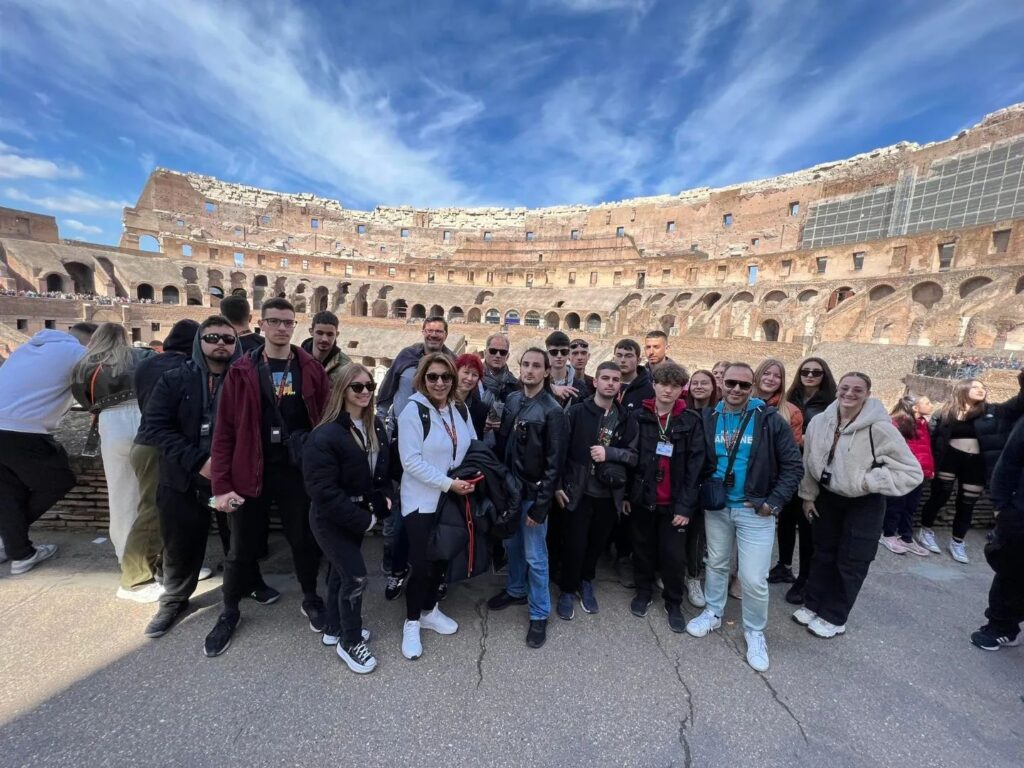“Environmental and Land Planning: new professionalism for environmental protection and prevention of natural risks“ ( short-term learning mobility of VET learners) is a comprehensive program designed to equip students from vocational schools with practical knowledge and hands-on experience about new job opportunities in the field of the environmental protection and the preservation of natural resources. It is an approach to the world of professions at the forefront of tackling climate change and mitigating environmental risks.
Our training program is uniquely designed to provide you with hands-on experience and practical skills. Through a combination of workshops, visits to companies and institutions, interactions with experts, and collaborations with universities, you’ll gain the knowledge and expertise needed to excel in the field of environmental and land planning.
Workshops: Engage in interactive workshops that simulate real-world environmental challenges. Apply your knowledge and problem-solving skills to find innovative solutions.
Company Visits: Step into the world of sustainability by visiting environmentally conscious companies and institutions. Witness firsthand how businesses are implementing eco-friendly practices.
Meetings with Experts: Gain insights from experts in the field through interactive discussions and Q&A sessions. Learn from those who have practical experience in environmental protection and risk prevention.
University Collaborations: Partner with universities to access cutting-edge research and resources. Leverage academic expertise to explore emerging trends and technologies in the field.
This program is not just about theory; it’s about practical application. You’ll leave with a robust skill set and a deep understanding of how to make a positive impact in the realms of environmental protection and sustainability.
Program Overview:
This short-term learning mobility of VET learners is designed to provide Erasmus students from vocational schools with a comprehensive understanding of environmental and land planning, emphasizing the new professionalism required for effective environmental protection and the prevention of natural risks. The course will combine expert lectures, company visits, workshops, and practical activities to ensure a holistic learning experience.
Our programs are developed in agreement with each european sending school.
Introduction to Environmental and Land Planning
- Welcome and orientation
- Introduction to the course objectives and schedule
- Ice-breaking activities
- Overview of environmental and land planning concepts
Environmental Regulations and Policy
- Expert lecture on national and international environmental regulations
- Discussion of environmental policy and its impact
- Practical exercise: Analyzing environmental policies in different countries
Biodiversity and Ecosystem Management
- Expert lecture on biodiversity conservation and ecosystem management
- Field trip to a local nature reserve or national park
- Group discussions and presentations on the importance of preserving biodiversity
Climate Change Mitigation and Adaptation
- Expert lecture on climate change, mitigation strategies, and adaptation measures
- Workshop on carbon footprint calculation
- Group project: Develop a climate adaptation plan for a hypothetical city
Water Resources Management
- Expert lecture on water resources and their sustainable management
- Visit to a water treatment plant or a river restoration project
- Hands-on water quality testing
Sustainable Land Use and Urban Planning
- Expert lecture on sustainable land use and urban planning
- Guided tour of an eco-friendly urban development project
- Design workshop: Create a sustainable urban development plan
Waste Management and Circular Economy
- Expert lecture on waste management and the circular economy
- Visit to a recycling facility
- Waste sorting and recycling competition
Environmental Risk Assessment and Management
- Expert lecture on natural risks, risk assessment, and risk management
- Simulation exercise: Respond to an environmental emergency scenario
- Group presentations on risk management strategies
Global Objectives:
- Understanding Environmental Concepts: To provide Erasmus students with a solid understanding of environmental and land planning concepts, regulations, and policies, empowering them with the foundational knowledge necessary for effective environmental protection and risk prevention.
- Practical Skills Development: To equip students with practical skills in various environmental areas, such as biodiversity conservation, climate change mitigation, sustainable land use, and waste management, ensuring they can apply their knowledge in real-world scenarios.
- Professionalism and Ethical Responsibility: To instill a sense of professionalism and ethical responsibility in environmental and land planning, fostering a commitment to environmental protection, sustainable development, and the prevention of natural risks.
- Interdisciplinary Collaboration: To encourage interdisciplinary collaboration by bringing together experts from various fields, providing students with a holistic view of environmental challenges and the importance of collaboration in addressing these issues.
- Global Perspective: To offer a global perspective on environmental issues by examining different national and international regulations, policies, and practices, enabling students to appreciate the diversity of approaches to environmental protection.
Learning Outcomes:
1. Knowledge Acquisition:
- Understand the key concepts of environmental and land planning, including regulations and policies, biodiversity, climate change, and more.
- Identify and describe environmental risks and their potential impact.
2. Practical Skills:
- Conduct water quality tests and analyze results.
- Design sustainable urban development plans.
- Evaluate the environmental impact of construction projects through mock environmental impact assessments (EIAs).
- Develop climate adaptation plans for cities.
3. Problem-Solving and Critical Thinking:
- Analyze complex environmental challenges and propose solutions.
- Assess environmental risks and devise risk management strategies.
- Apply critical thinking to evaluate the sustainability of business practices.
4. Ethical and Professional Responsibility:
- Understand the ethical responsibilities of professionals in environmental and land planning.
- Develop a sense of responsibility for preserving biodiversity, mitigating climate change, and ensuring the sustainable use of resources.
5. Interdisciplinary Collaboration:
- Collaborate effectively in diverse groups during workshops and field visits.
- Understand the importance of interdisciplinary collaboration in addressing complex environmental issues.
6. Global Perspective:
- Compare and contrast environmental regulations and policies from different countries.
- Appreciate the global context of environmental challenges and solutions.
7. Communication Skills:
- Effectively communicate findings, project proposals, and environmental impact assessments to peers and experts.
- Improve presentation and group discussion skills.
8. Practical Experience and Application:
- Apply learned knowledge and skills through hands-on activities, company visits, and group projects.
- Develop the ability to practically address environmental issues in real-world scenarios.
9. Evaluation and Assessment:
- Understand how to evaluate and assess the environmental performance of businesses and infrastructure projects.
- Apply problem-solving and critical thinking skills to assess and propose improvements.


These global objectives and learning outcomes collectively ensure that Erasmus students not only gain theoretical knowledge but also practical skills and a strong sense of ethical responsibility in the field of environmental and land planning. This program aims to produce well-rounded professionals capable of addressing the complex challenges of environmental protection and risk prevention on a global scale.
Infol Education offer outstanding programs that combine top-notch education with an unforgettable cultural experience in the Eternal City.
Infol Education, renowned for its expertise in organizing Erasmus programs, ensures that participants receive top-notch training courses that not only enhance their skills but also provide a unique cross-cultural experience.
Rome serves as the perfect backdrop for this learning adventure. Join Infol Education
